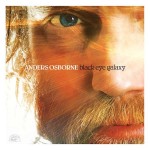Good artists can achieve greatness in their creations, arriving through a combination of luck and hard work at a place where they define themselves. Great artists are measured by the ability to make such work, then transcend it. With Black Eye Galaxy, I believe Anders Osborne has transcended from being a good artist capable of great things to a great artist capable of creating a masterpiece. This may not be that masterpiece, but it’s a formidable consolidation of the ideas presented on his great last album American Patchwork.
Black Eye Galaxy is at once a catalog of influences and an intensely personal revelation. Osborne employs a light/heavy dichotomy that reflects every aspect of his inspiration, from the hardest rock to the gentlest acoustic music. It’s a strategy that recalls such classic moments as Led Zeppelin IV and Young’s After the Gold Rush. The album opens with the sledgehammer beats of “Send Me a Friend,” a track that dares the listener to compare it to Zeppelin’s “When the Levee Breaks.” Its edge-of-distortion attack demands a rock vocalist of the caliber of Robert Plant or Roger Daltrey to cut through the sonic onslaught, and Osborne delivers the performance of his life here, singing strong, well-articulated high notes that sound like they’re summoned from the psychic terror he had to face to overcome his addiction. “I’m lost out here,” he wails. “Please somebody send me a friend.”
This song sets such a dramatic tone for the record that it takes multiple listenings to realize the album’s full range of moods and styles. Though simmering frenzy marinates “Mind of a Junkie,” Osborne’s playing is subtle and harmonically challenging, reaching into an improvisational jazz mode for the lengthy, trance-like solo. The song is peppered with insights about his disease, as Osborne fails in attempts to meditate, suffers from panic attacks and realizes, “I isolate myself so I get more tattoos.” It’s like the rock equivalent of Ray Milland in The Lost Weekend, culminating in the agonizing plea, “Please somebody save me from my craziness.”
That “somebody” emerges in the next two songs, “Lean on Me”/”Believe in You” and “When Will I See You Again?” The first is a devotional love ballad built around a simple, beautiful melody, and the second a medium-tempo rocker with a sweet chorus and a haunting bridge. Both tunes clearly refer to Osborne’s muse, his wife Sarah, who is also undoubtedly the inspiration for the mysterious woman of “Black Eye Galaxy,” the album’s title track and musical fulcrum, with its languorous exposition and the epic scope of its solo, which moves from delicate wah-wah textures into total abstraction, then climbs a dramatic ascending melodic stairway to the final, redemptive chorus.
If the rougher-hewn tracks on the album offer insight to Osborne’s torments, the quiet ones show him more self-aware. “Sometimes I wanna get real drunk,” he sings. “I know I’m not supposed to.” Addiction is like a bad friend or an unfaithful lover when Anders has this kind of handle on it, lamenting that it “took all those years from me and you.” Yet Osborne does not shut himself off, as the glorious chorus explodes with untrammeled joy. “So I’m goin’ out on the ocean,” he sings. “I’m heading up to Canada, tracking my roots.”
The album closes on an unexpected and totally satisfying note with “Higher Ground,” a song co-written by Osborne and Henry Butler. Osborne sings this song of triumph over his troubles backed by a string section, then is joined on the final chorus by a choir of friends and family. “Nobody can bring me down,” Osborne asserts with prayer-like affirmation, “’cause I’m standing on higher ground.”





